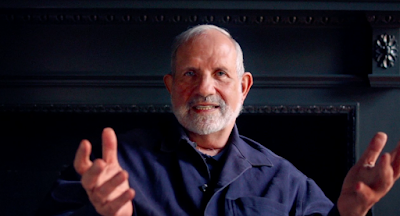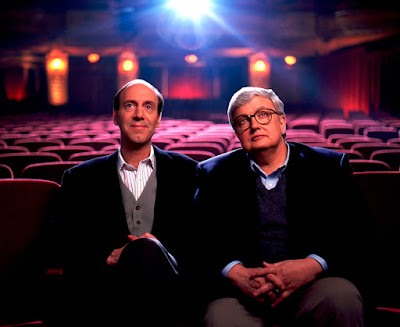Friday, August 4, 2023
THE TALKATIVE KID, THE THOUGHTFUL ADULT – 25 Years as an Online Film Writer
Friday, July 16, 2021
"The Shining" Revisited
What is it about the Overlook Hotel that casts such an ominous cloud? How do the mysterious, inexplicable events surrounding a small and isolated family affect the terror they inflict on one another? These are just two of the broad questions hovering over a long mystery in “The Shining,” a movie of ageless dexterity that also remains one of the more fascinating case studies in academic film analysis. When it arrived in theaters over four decades ago, the conventional wisdom at the time had been swift and dismissive: the exacting hand of one Stanley Kubrick had lost sight of a cogent vision, supplementing the famous source material by Stephen King with so much surrealistic ambiguity and nonsense that he had released a labyrinthian mess instead of a probing psychological essay. But much like his own “A Clockwork Orange” and “2001: A Space Odyssey,” time has offered a generous reassessment, and now the picture is usually seen hovering towards the top of most lists of the greatest horror movies ever made. When I first encountered it at the age of 15, my admiration for its technical skill and tone were undermined by an inability to decipher the clues. What was happening to the Torrance family? Were they being haunted by ghosts, pitted against one another by elaborate mind games? Would they have been seen if the young boy at the center of the action were not clairvoyant? Or were they simply imagined by people whose sanity had been compromised by isolation? Over 20 years and dozens of viewings later, I can finally speak with confidence on some of the great paradoxes the story weaves.
Wednesday, February 27, 2019
"American Beauty" Revisited
Like the French Algerian Meursault and Holden Caufield after him, the character of Lester Burnham has soared above the peak of lively resentment and been canonized as one of the great antiheroes of modern pop culture. His presence in “American Beauty” plays to the ongoing call for the everyman’s rejection of procedure, which has been necessitated by the steady decline of the modern workforce in a culture that imprisons them in cubicles and conforms their thoughts to a script of faux courtesy. Traces of that distinction were first visible in the comedy “Office Space,” released in the same year, but this was the moment where the ideology found its most unflinching force: a man whose brutal honesty felt like a nudge towards obliterating the conventional wisdom. Consider how much of the film about him involves the silent bewilderment of supporting players, right down to a wife and daughter who can only look on, in stunned silence, while a pathetic shell of a man suddenly discovers his voice. Perhaps they are surprised to find he still has a spine. Perhaps they are mourning the inability to continue using him as a scapegoat. Or maybe it’s because they can no longer see beyond the ceiling of what he is gradually tearing down.
Monday, December 31, 2018
The Winds of Hope - 2018 in Review
Saturday, August 4, 2018
"The Black Cauldron" Revisited
“Legend has it, in the mystic land of Prydain, there was once a king so cruel and so evil, that even the gods feared him.” The opening narration inaugurates the curse shrouding the fabled black cauldron, an object of such immense danger that its very mention instills dread in the hearts of commoners. Although centuries came and went while it lay dormant, obscured by the spells of defensive witches, a new enthusiasm has gripped the totalitarian forces of the Horned King, who pursues it with persistent determination. In his possession, the cauldron would unleash the frightening power of necromancy, allowing its possessor to raise an unstoppable army of dead soldiers, essentially making him immortal. And all of creation would succumb to this destructive curse, including those whose personalities necessitate the enthusiasm of the audience: a teenage adventurer who dreams of heroism, a clumsy bard, a distraught princess, a furry and inquisitive beast, a snarky sprite and an oracular pig, who also provides the key to discovering the whereabouts of the coveted relic.
Wednesday, August 1, 2018
It Started With a Cauldron...
Friday, May 18, 2018
Lessons from Criterion:
"The Ascent" by Larisa Shepitko
Sunday, March 4, 2018
Predicting the Winners of the 90th Oscars
Heading fretfully into its 90th year, Oscar is set to descend on a bold and foreign new climate when the curtain rises on Hollywood this Sunday. He has never been one to scoff at the wide array of political trends that dominate his parties, to be sure, but even he must be sensing a strange air looming over the 2018 ceremony. It was, after all, the year that sexual abuse dominated the headlines and diminished the glitz of the city’s bright lights. And now in the final hour of those revelations, the notorious #MeToo movement looks poised to flip the script on the industry right down to its most treasured traditions – including the annual practice of handing out those famous gold statues everyone covets.
Sunday, December 31, 2017
A Most Volatile Year
Friday, August 4, 2017
"Last House on the Left" Revisited
In some underhanded way a horror film has the capacity to contemplate one’s destructive tendencies just as it does to abuse and torment the souls of the innocent. More perceptive directors discover those possibilities not by holding out optimism in bleak scenarios, but usually by looking through the cracked mirror of passive acceptance. That is the sort of wisdom that informs many of the early Wes Craven pictures, several of which were made with a distinction that raises them above the more sensationalized Hollywood gorefests of later times (even his own). To most they possess the foresight to see a purpose beyond the astonishing violence, and to regard them is to understand that there are some terrible side-roads one must walk before the fates can restore light to an obscured path. But what is one to make of “Last House on the Left,” his nihilistic debut, which by all indications ought to have been one of those endeavors forever lost in the wastes of oblivion? Like a painful secret it persists achingly through the minds of those who discover it, often to a point of mystification; decidedly outside of conventional standards and made quickly and cheaply in a span of weeks, little was there to announce it as anything other than just another trenchant exercise in the murderous tendencies of the disturbed. And somehow that was far more than enough.
Monday, May 1, 2017
"The Exorcist" Revisited
“The movie is one of the greatest and most hypnotic ever made, a work of sheer genius from the first frame until the last.” – taken from the original Cinemaphile review of “The Exorcist”
So well-known and influential are the underlying devices of William Friedkin’s “The Exorcist” that few among modern filmgoers now remember the power of their source. Perhaps the most notorious of all horror films, it was the product of a time still concealed in the facade of restraint when it came to visiting the devious corners of a filmmaker’s mind. Shock was always possible – as had been most apparent by Hitchock’s “Psycho,” or Wes Craven’s “Last House on the Left” – but rarely did it stick so persistently in the mind, invariably undermining one’s sense of individual control. We could rationalize how to get away from a crazy killer or how to avoid a menacing threat lurking around the corner, but how did one evade being possessed by a demonic entity? What sense of recovery would have been palpable? Some argue that implication can singlehandedly be credited with changing the trajectory of the entirety of the genre, which by that point had been dominated by homicidal minds or ambitious monsters in lurid fantasy. Here was a movie about real people, real situations and real considerations of faith, in which an innocent teenage girl became the unknowing victim of spiritual violence that stretched beyond existing moral implications. Few among those early viewers can say they walked away from the picture unchanged by the experience, and those that claim otherwise may not be the sorts you prefer to keep company with.
Wednesday, March 22, 2017
The Cinema Soul
I sensed this the first time I saw “The Wizard of Oz,” probably the most important live action film of my youth. For me it was as current as the visual of my schoolmates running across the playground, and made more profound by the belief that those peers could sprout wings and take off midflight if they felt inclined. That, I believe, is one of the primary strengths of a timeless picture: if its images could reach you in a way that blurs the lines between worlds, then they slip past the notion of mere escapism and become extensions of personal experiences. For what seemed like years after I would often reflect on Dorothy’s adventures – in film and in book – and how my own would seem had that cyclone come and carried me away instead. And Oz, as whimsical as other worlds come, felt like the hidden fortress of a backyard daydream that could become tangible with just the right squint of a young eye.
Saturday, December 31, 2016
2016, A Eulogy
Thursday, December 29, 2016
In Memoriam, 2016
Monday, December 5, 2016
De Palma (2015)
Monday, February 29, 2016
Contention in the Contest: A Final Word on the 2016 Academy Awards
Audiences who descended on the Dolby Theater in Hollywood on Sunday night were certainly expecting active discussion about the diversity issue at the Academy Awards, but when Chris Rock took the stage to open this year’s ceremony, they probably didn’t expect it to be as sharp and insistent as it wound up being. What it also was, even amongst the numerous laughs, was an opportunity for the comedian to use his tongue to spread around the underlying blame of the issue, even to those on his side of the aisle. In one of the night’s most memorable jokes, his aim fell directly on Jada Pinkett-Smith, who lashed out after her husband, Will Smith, wasn’t nominated. “Jada boycotting the Oscars is like me boycotting Rihanna’s panties,” he shot back. “I wasn’t invited!”
Thursday, December 31, 2015
2015: The Final Curtain
Monday, November 2, 2015
The New Revolution
Monday, August 31, 2015
Wes Craven, 1939 - 2015
That quote – as well as many morsels of seasoned wisdom, both on screen and off – is now all that is left of the man that once was the gifted Wes Craven. Gone at the age of 76 due to brain cancer, the assemblage of dedicated fans that he acquired over the course of a prosperous 40-year career must now unite in contemplative pause, jolted by the shock of his sudden passing all while trying to remain in perspective of celebrating an extensive backlog of notable film accomplishments. Many referred to him as the “Master of Horror” during the height of his popularity, and perhaps that title is as apropos as any singular classification can be; he was a pioneer that brought foreboding ideas to the height of their fearsome possibilities. What was a scary movie, really, other than a collection of grotesque visuals meant to inspire momentary outburst in local multiplexes in the early years of cinema? When he took hold of the concept, he did the unthinkable: trapped it all into a context of shuddering realism.




















